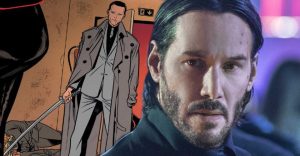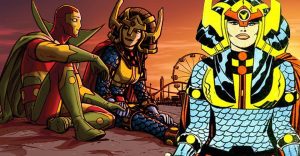Star Wars Reveals Why Qui-Gon Jinn Wasn’t On The Jedi Council

Star Wars has explained why Qui-Gon Jinn never served on the Jedi Council. In The Phantom Menace, dialogue establishes Qui-Gon was a bit of a maverick, having a long history of defying the Council’s wishes. During the movie, of course, this pertains to Anakin Skywalker’s training. Yoda and the other Council members felt the boy was too old to become an apprentice, while Qui-Gon firmly believed Anakin was the Chosen One mentioned in an ancient Jedi prophecy. Even in his dealings outside of the Council, Qui-Gon didn’t have any qualms about bending certain rules to get his way. When wagering on Anakin’s freedom before the podrace, he used the Force to manipulate Watto’s chance cube.
What’s interesting about the Jedi Council’s portrayal in the prequels is that it essentially deconstructs their heroic, mythical status. While it’s true the Jedi served dutifully in the Clone Wars and fought to preserve democracy in the galaxy, the prequels also pointed out plenty of flaws in their approach. The Jedi were seen to be very dogmatic and even arrogant at times, allowing the rise of the Empire to happen right under their noses. It’s easy to see why the Council never saw eye-to-eye with Qui-Gon, which makes it all the more surprising they once offered him a seat.
In Claudia Gray’s new novel, Master & Apprentice, one primary subplot involves Yoda inviting Qui-Gon to become a member of the Jedi Council. In a rare moment of self-awareness, the others admit they could benefit from fresh perspectives and are interested in seeing what Qui-Gon could offer. Before Qui-Gon can make his decision, he and Obi-Wan are assigned a new mission, and readers have to wait until the end to learn his answer. Of course, Qui-Gon passes, citing his changing relationship with the Force as the reason why. He felt joining the Council would “take me far away from that goal,” but a passage in the novel digs deeper into his mentality:
“Qui-Gon knew the Council to be wrong about many things. He felt they’d allowed the Jedi Order to become a sort of chancellor’s police, rather than concentrating on knowing the Force. Yes, they were wise to refuse to rule – but unwise to simply accept the status quo. Short-sighted, to lose touch with the living Force by spending so much of their time and energy on enforcing laws that could as easily be left to civilian authorities. Immoral, to refuse to act against evils such as slavery.”

Qui-Gon’s disconnect with the Council pops up periodically throughout the book. A noteworthy instance is when he contacts the Council to push for the revision of a treaty that would in essence legalize slavery on the planet Pijal. Qui-Gon believes this would be morally wrong, but Yoda feels it’s better for the Republic to just oversee the signing of the treaty without causing any major disruptions. Perhaps in this moment, Qui-Gon realized he would forever be an outsider on the Council, never having enough influence to change their mentality. His conversation with Yoda regarding slavery was particularly enlightening from a certain point of view, illustrating to Qui-Gon that the Council was very much stuck in its old ways.
Instead, Qui-Gon felt it would be a more productive use of his time to simply surrender to the Force and see where it took him. In hindsight, that was a wise decision. Following his own path, Qui-Gon not only discovered Anakin and successfully vouched for his training (which might not have happened if a different Jedi went on that mission in Episode I), he also learned the secrets to achieving immortality and becoming one with the Force, passing knowledge down to Obi-Wan and Yoda. Perhaps it’s fitting the Jedi who was never a stickler for the Code was able to accomplish all this.
- Star Wars 9 / Star Wars: The Rise of Skywalker (2019)Release date: Dec 20, 2019
About The Author


















